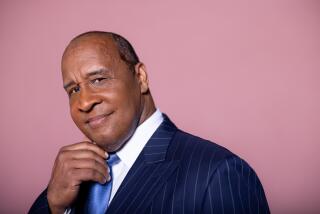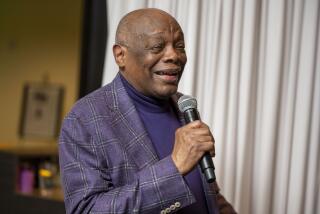ELECTIONS ’88 : Victorious Tucker Pledges Punishment for Challenger
Assemblyman Curtis R. Tucker (D-Inglewood) put more effort into this year’s Democratic primary than in any spring contest since he went to Sacramento in 1974.
Though Inglewood Councilman Daniel Tabor was Tucker’s most formidable primary election opponent in his 14 years as 50th district assemblyman, the result was the same as in past races: a resounding Tucker victory.
Tucker made good on his promise to crush Tabor, receiving 76% of the vote in the bitterly personal generational fight. That equals Tucker’s typical victory margins in general elections and primaries where he has faced lesser-known opponents or no opposition and scored over 70% of the vote.
At his campaign headquarters Tuesday night, a relaxed Tucker, 70, reaffirmed his pledge to punish the 33-year-old Tabor for his challenge. “I am going teach this young man a lesson,” Tucker said.
Tucker said he will support a candidate against the two-term councilman in what could be a crowded Inglewood City Council election next April. Tucker’s son, Curtis Tucker Jr., has said he plans to run for Tabor’s seat. In addition, Tucker’s son-in-law and legislative aide, John Gibbs, said Wednesday he also is considering a bid against Tabor.
The elder Tucker said Tuesday that if his son runs, “I will support him with whatever I’ve got.”
In the Assembly race, Tabor’s plans for a spirited grass-roots challenge never got off the ground. Tucker used the powerful Democratic caucus network headed by Assembly Speaker Willie Brown to raise about $275,000 to Tabor’s $20,000, flooding the district with signs and campaign literature and reaffirming his popularity in an area where he has been called the “elder statesman” and “godfather.”
Said Tucker: “I reintroduced myself to my constituents. I feel 20 years younger. I don’t plan to retire until, say, 80.”
The seven-term assemblyman will face long-shot Republican challenger Michael Davis in November.
Tabor fell short of even the 30% that allies had said would be a respectable showing. But he still told a cheering group of predominantly young supporters at an election night party that he had laid groundwork for future bids.
“We’ve put incumbents on notice that there are people out there who will mount a challenge if the job is not being done,” Tabor said, promising to seek the Assembly seat again in two years. “We had nothing to lose.”
Inglewood politicians said Tabor, who has been regarded as up-and-coming in black politics, may face an all-out assault next April from four or five challengers.
Tabor said he welcomed any and all opponents, alluding to the fact that both Tucker’s son and son-in-law have talked about running against him.
“I’d like nothing more than to take out my frustrations on another Tucker,” Tabor said. “No one has served my (council) district like I have.”
Another potential candidate is former Councilman Andrew Isaacs, who expressed interest Tuesday in reclaiming the seat he lost to Tabor in 1981. Others may also jump into the fray, perceiving Tabor as vulnerable after Tucker--a current resident and former councilman of Tabor’s east Inglewood district--beat Tabor in that council district with 4,270 votes to Tabor’s 2,391.
Put on Defensive
Tucker struck quickly at the beginning of the campaign with an attack on Tabor spearheaded by a campaign mailer reprinting a 1986 letter by Tabor criticizing presidential candidate Jesse Jackson.
After putting Tabor--a longtime Jackson supporter with strong potential appeal to young blacks--on the defensive, the veteran Assemblyman pumped a series of mailers into district households. The literature portrayed Tucker as a fighter for the district and venerable family man, featuring his grandchildren in several instances, and listing endorsements from an array of powerful Democratic politicians, local ministers, law enforcement groups and doctors.
Financial and organizational problems forced Tabor to rely on phone banks, personal appearances and a single mailer to present himself as a progressive young leader challenging a complacent incumbent on such issues as crime and health care.
More to Read
Get the L.A. Times Politics newsletter
Deeply reported insights into legislation, politics and policy from Sacramento, Washington and beyond. In your inbox three times per week.
You may occasionally receive promotional content from the Los Angeles Times.










